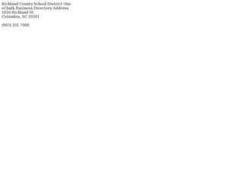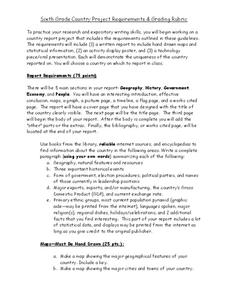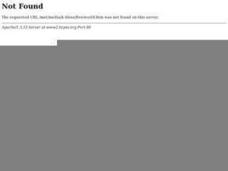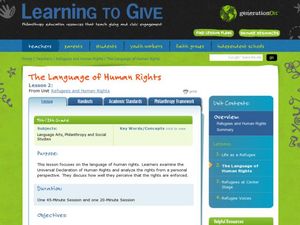Curated OER
Fighting 20th-Century Tyranny
Middle schoolers examine political regimes of the 1900s. In this government structures lesson, students watch "Fighting 20th Century Tyranny," and discuss the Holocaust and communism. Middle schoolers simulate mock interviews with the...
Curated OER
Civilizations of the Ancient Near East
Sixth graders investigate ancient civilizations by creating a research project. In this world history lesson, 6th graders investigate historic civilizations developed close to important rivers of the near East. Students create a...
Curated OER
The Water Cycle
Fourth graders explore changes in water forms. In this water cycle instructional activity, 4th graders build a water cycle model and monitor it for 2 weeks in order to understand that water changes state as it moves through the cycle.
Curated OER
Animal Tales Around the World
Students explore characteristics of Indian Tales/ Parables. In this literature lesson, students compare contemporary society to western culture through analysis. Students create their own tales using this genre.
Visa
Financial Forces: Understanding Taxes and Inflation
Take the opportunity to offer your young adults some important financial wisdom on the way taxes and inflation will affect their lives in the future. Through discussion and review of different real-world scenarios provided in this...
Curated OER
Food for Thought: Hunger???Around the Block, Around the World LESSON 2: Local Hunger and Malnutrition
Students examine the difference between hunger and malnutrition. They study the idea of hunger as a theme in literature while discovering how communities can solve hunger problems.
Reading Through History
Anti-Federalist Paper No. 47
The path to a more perfect union was rockier than most history books would lead you to believe. Young historians read “Antifederalist No. 47,” written by James Madison (under the pen name “Centinel”), which sharply criticizes the...
Curated OER
Comparing Sparta and Athens
Students are taught the differences between totalitarianism and democracy. They discuss the historical roots of the democratic tradition. Students are introduced to the term totalitarianism and are told that it is a form of government...
Mesa Public Schools
Country Project
Give your young learners the chance to discover more about countries in their world community with a research project. Class members write reports on an assigned country and include such major features as geography, important historical...
Curated OER
A System of Rules
Students write letters, create models, create a photo display, and make charts about the rules that a state has. In this rules lesson plan, students learn about and make different displays of how states come up with rules, change them,...
Curated OER
Citizen Me
Fifth graders examine what it means to be a citizen. Using the Constitution, they discover the functions and purpose of government. They compare and contrast the difference between a democracy and a monarchy. As a class, they discuss...
Curated OER
The World Almanac for Kids
Fifth graders identify and compare the features of The World Almanac for Kids in the print form and in the CD-ROM/ on-line form. They predict which format is the easiest to access and the most informative, then draw conclusions from...
Curated OER
Nationalism in North Africa and the Middle East
Africa and the Middle East are the focus of this Social Studies PowerPoint. After viewing many slides that are packed with historical facts, viewers answer questions such as, "How was the struggle for independence in Algeria different...
Curated OER
The Language of Human Rights
Did you know that there are 15.2 million refugees in the world? High schoolers will read "The Universal Declaration of Human Rights" and learn how they can get involved to lower this surprising number. To really encourage involvement,...
ProCon
Gold Standard
If all the mined gold in the world was melted across a football field, it would rise 5.4 feet. That's just one interesting fact pupils learn when using the debate topics website to determine if the United States should return to a gold...
Curated OER
2nd Grade - Act. 17: Source Relay
Help your 2nd graders understand the difference between natural and man-made materials. They will sort breakfast food items into sources: store, factory, natural world, and farm. They will work together to classify, form conclusions, and...
Chicago Botanic Garden
Climate Change Impacts on Ecosystem Services
The fourth activity in a series of five has classes participate in a jigsaw to learn about global impacts of climate change and then share their new information with a home group. Groups then research impacts of climate change (droughts,...
Constitutional Rights Foundation
Driver’s Licenses And Unauthorized Immigrants
Should driver's licenses be granted to unauthorized immigrants? That is the question class members grapple with in a lesson that asks them to first read a fact sheet that details the arguments for and against licensing unauthorized...
Deliberating in a Democracy
Recycling
How often have you passed by a recycling container in your school? Scholars research the issue of recycling in the ever-changing global world. Using documentation and video evidence, they form their own opinions on recycling and how it...
Japan Society
Changing Times, Changing Styles: New Japanese Literary Styles of the Late Nineteenth Century
Focusing on Doppo's "Unforgettable People" and late nineteenth century Japanese literature, this resource also leads to discussions of form being dictated by content. Explore the development of new literary styles first-hand by...
Curated OER
Parthenon
Ninth graders explore he purposes of the Parthenon. In this World History instructional activity, 9th graders create a complete picture of the Parthenon. Students research one aspect of the structure and report their findings back to...
Curated OER
Lesson: Allison Smith: What Are You Fighting For?
Trench art is a nontraditional art form created by soldiers in trenches during wartime. Artist Allison Smith connects her art to the American Revolution and the question: "What are you fighting for?" Kids examine her art, how it connects...
Curated OER
Smoking Today = Smoking Tomorrow
Examine statistical data to recognize the relationship of statistics to real-world issues. Pupils navigate e-stat using the Internet and find data about social issues. They complete a worksheet with their data and create an anti-smoking...
US Environmental Protection Agency
A Mock Town Meeting on a Proposed Tank Farm
Intended as a follow up to the Protecting Your Drinking Water activity, young environmentalists use their assessment of the a hypothetical town's water supply to debate the installation of underground chemical storage tanks. With the...

























